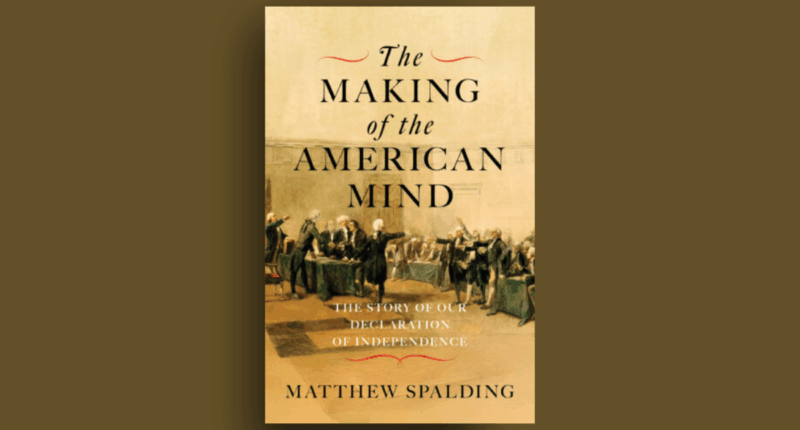America is on the verge of celebrating its semiquincentennial, and, thanks to the White House’s task force for the 250th birthday, all indications point to a thrilling, year-long party. There will be a “National Garden of American Heroes,” a “Great American State Fair” of nationwide events, and a televised “Patriot Games” competition for high school athletes. Yet, such a decidedly patriotic celebration of our nation was by no means inevitable.
Only six years ago, The New York Times published its infamous 1619 Project, which reframed the founding of our nation not around the Declaration of Independence but the original importation of African slaves to the fledgling American colonies. Former Democratic presidential nominee Kamala Harris called the 1619 Project a “masterpiece” and a “powerful and necessary reckoning of our history.” The nation was soon awash in anti-founding narratives propagated by pseudo-intellectuals who, through various educational initiatives, have sought to impart their unique brand of cynical hatred to the next generations of Americans.
Thanks to a variety of political and academic efforts, much of this anti-American propaganda has been stymied. One of the unsung heroes in this important project is Dr. Matthew Spalding, a Hillsdale College scholar of the founding who was also the executive director of the President’s Advisory 1776 Commission, which produced “The 1776 Report.” His new book, The Making of the American Mind: The Story of Our Declaration of Independence, is an excellent reminder of why we have much to celebrate in 2026.
Why The Declaration Matters
In his introduction, Spalding asserts that America “is a good country, even a great country, perhaps the greatest, not because it is perfect … but because it is dedicated to, and constantly aspires to uphold, permanent principles about human liberty that are true.” It is in the Declaration of Independence that we find those principles articulated.
Thus, understanding and loving America requires knowing the Declaration. As Abraham Lincoln described the Declaration, it is “an abstract truth, applicable to all men and all times,” an eternal “stumbling-block to the very harbingers of re-appearing tyranny and oppression.”
The Making of the American Mind is the story of the making and meaning of the Declaration in 1776. Rather than attending to only one aspect or person, Spalding’s work is a commentary on the Declaration as a whole. It is also cleverly structured. Each chapter provides historical context and scholarly interpretations of the meaning of a phrase or group of phrases from the Declaration. Then those phrases are presented within the broader, gripping story of the events leading up to the signing of the Declaration.
American colonists understood themselves as Englishmen and subjects of the British crown entitled to certain rights, as articulated in such documents as the Petition of Right (1628), the Habeas Corpus Act (1679), and the Declaration of Right (1689), but also a broader culture of liberty and representation that had existed among the early Saxons before even the Norman conquest of 1066. Yet the Declaration goes further than this, asserting that the colonists enjoy not only rights by way of English citizenship, but by way of nature (more on that below).
As citizens, the Americans had many legitimate grievances against the British crown, including the king’s abuse of power, usurpation of power, and acts of despotic power. Moreover, because of the initial legal agreements between the crown and the colonies, the colonists asserted that Parliament actually had no power to legislate over the internal affairs of the colonies through such measures as The Stamp Act, Sugar Act, Townshend Acts, and Intolerable Acts.
The most influential factor in shifting American public opinion toward independence was an anonymous forty-seven-page pamphlet called Common Sense in January 1776, written by the English-born polemicist Thomas Paine. In a population of two and a half million people, the pamphlet sold 100,000 copies in three months and an estimated half-million copies over the course of the American Revolution — an all-time American best-seller. Another critical turning point was intelligence obtained by General Washington that the British government had contracted for as many as 40,000 “mercenaries” — principally from the state of Hesse-Kassel — to fight in America. Certainly, it changes one’s calculus regarding how your government perceives you when it contracts foreign mercenaries against you!
The Influences on the Declaration
In the popular imagination, the Declaration is usually understood as singularly Jefferson’s creation, though it was in fact a result of “group editing” that one prominent scholar has called “one of the great marvels of history.” Indeed, the primary draftsman’s identity was at first not published. It was not until the 1790s that it was widely known that Jefferson was the primary author.
Far from being a revolutionary document, Jefferson expressly declared: “I did not consider it as any part of my charge to invent new ideas altogether & to offer no sentiment which had ever been expressed before.” Later, Jefferson explained that “all” the authority of the Declaration derived its reasoning from “the harmonizing sentiments of the day, whether expressed in conversation, in letters, printed essays, or in the elementary books of public right, as Aristotle, Cicero, Locke, Sidney, etc.” Spalding also notes the influence of a variety of other intellectual influences, including the Bible, the ancients (e.g. Plato, Livy), the medieval era (e.g. Aquinas), and post-Reformation English legal theory (e.g. Hooker, Coke, Blackstone).
There is a certain strand of American political thought today — largely found among conservative Catholics — that argues that among all these influences, Locke represents the intellectual linchpin of the founding. If that’s the case, this would be problematic given that Locke in An Essay Concerning Human Understanding presents an empiricist and hedonist conception of knowledge that seems to contradict his traditional articulation of man and politics in his Two Treatises on Government.
Yet Spalding makes an important distinction: What matters in the context of the founding is less identifying some “essential” Locke, which supposedly poisoned the American government from the beginning, and more how the Americans understood and used Locke’s arguments. In truth, we have little evidence that the founding generation relied on Locke’s epistemology expressed in An Essay on Human Understanding.
Far more influential on the signers of the Declaration (and later framers of the Constitution) is a Christian-informed theory of natural law. Most of the signers of the Declaration were in the mainstream of Protestant religious belief, and the Second Continental Congress of 1776 called for days of prayer and fasting. Furthermore, the Declaration’s language describing men as being “endowed by their Creator with certain unalienable Rights” implies the Judeo-Christian idea of the imago dei, man being created in the image of God.
And, as Spalding argues, the “happiness” of that famous phrase “life, liberty, and the pursuit of happiness” is meant not in a subjective, emotive sense, but in the classical sense of eudaimonia, a happiness found in virtuous contemplation, which was subsequently appropriated by Christian theology to mean happiness found in a transcendent God.
Indeed, Spalding brilliantly correlates this phrase to the Constitution, the very first amendment of which enshrined religious liberty precisely so that man might realize his supreme good. That the Declaration ends with two further references to the divine — using language that mirrors that of the Calvinist confessional document, the Westminster Standards — further implies a specifically theistic God involved in the affairs of men.
What The Signers Risked (and Lost)
The signers would need that strong confidence in divine providence, given what they were doing. After John Hancock, president of the Continental Congress, famously signed the Declaration — large enough, the story goes, that the English could read his name without spectacles — he emphasized that unanimity was required, even to the point of death. In reply, Benjamin Franklin is reported to have said: “We must all hang together, or most assuredly we will all hang separately.” In truth, by putting their names to the Declaration, all fifty-six of those men were signing their own death warrant.
Many suffered dearly for their decision. Many served in the ensuing war, some of them being wounded, captured, and even tortured. Some had their property confiscated or destroyed. One, John Witherspoon, would lose his son in battle. Most would serve important roles, both in the military and government during the American Revolution, as well as after. Two, Adams and Jefferson, would become president (Washington could not sign, as he was already on campaign against British troops in New York).
The story of the Declaration of Independence is truly one all Americans should know, especially given our upcoming 250th anniversary. Thanks to Spalding’s highly accessible and very capably told account, Americans have no excuse for failing to understand our founding document and the ideas behind it that made us the greatest country in human history.
Casey Chalk is a senior contributor at The Federalist and an editor and columnist at The New Oxford Review. He is a regular contributor at many publications and the author of three books, including the upcoming “Wisdom From the Cross: How Jesus’ Seven Last Words Teach Us How to Live (and Die)” (Sophia Institute Press, 2026).









